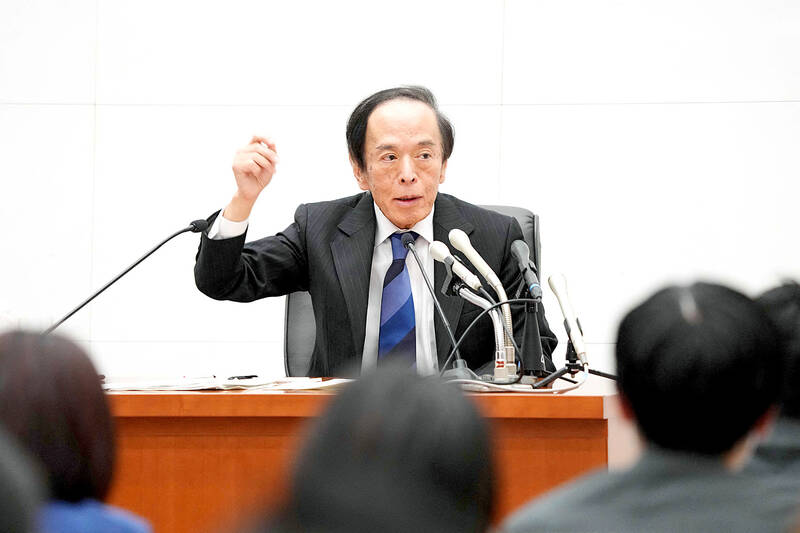The Bank of Japan (BOJ) should continue to proceed with monetary tightening, which would support a “normalization of the yen’s weakness” and rebalancing of bilateral trade, the US Department of the Treasury said on Thursday.
“BOJ policy tightening should continue to proceed in response to domestic economic fundamentals including growth and inflation, supporting a normalization of the yen’s weakness against the [US] dollar and a much-needed structural rebalancing of bilateral trade,” the treasury department said in its exchange-rate report to the US Congress.
“Treasury also stresses that government investment vehicles, such as large public pension funds, should invest abroad for risk-adjusted return and diversification purposes, and not to target the exchange rate for competitive purposes,” the report said.

Photo: AFP
The rare, explicit mention of Japan’s monetary policy turns Washington’s focus to the BOJ’s ultra-low interest rate, which is seen as among factors that have kept the yen weak against the US dollar.
Asked about the report, Japanese Minister of Finance Katsunobu Kato yesterday said that the Japanese government leaves monetary policy decisions to the BOJ.
“Based on this, we would like to refrain from making comments [on what was pointed out in the report],” he said at a news conference.
With regards to the report’s reference to pension funds, Kato said it was natural for pension funds to pursue their own purposes in fund management.
The treasury department said that no major US trading partner was found manipulating its currency last year, but that Japan, as well as Taiwan, China, South Korea, Singapore, Vietnam, Germany, Ireland and Switzerland, were on its monitoring list for extra foreign exchange scrutiny.
The BOJ ended its massive monetary stimulus last year and in January raised short-term interest rates to 0.5 percent on the view that Japan was on the cusp of durably hitting its 2 percent inflation target.
While the central bank has signaled a readiness to raise rates further, the economic repercussions from higher US tariffs forced it to cut its growth forecasts last month.
The slow pace at which the BOJ is raising interest rates has been seen by markets as a key factor keeping the yen weak against other currencies.
A Reuters poll, taken on May 7 to 13, showed that most economists expect the BOJ to hold rates steady through September, with a small majority forecasting a hike by the end of the year.

SEMICONDUCTORS: The German laser and plasma generator company will expand its local services as its specialized offerings support Taiwan’s semiconductor industries Trumpf SE + Co KG, a global leader in supplying laser technology and plasma generators used in chip production, is expanding its investments in Taiwan in an effort to deeply integrate into the global semiconductor supply chain in the pursuit of growth. The company, headquartered in Ditzingen, Germany, has invested significantly in a newly inaugurated regional technical center for plasma generators in Taoyuan, its latest expansion in Taiwan after being engaged in various industries for more than 25 years. The center, the first of its kind Trumpf built outside Germany, aims to serve customers from Taiwan, Japan, Southeast Asia and South Korea,

Nvidia Corp chief executive officer Jensen Huang (黃仁勳) on Monday introduced the company’s latest supercomputer platform, featuring six new chips made by Taiwan Semiconductor Manufacturing Co (TSMC, 台積電), saying that it is now “in full production.” “If Vera Rubin is going to be in time for this year, it must be in production by now, and so, today I can tell you that Vera Rubin is in full production,” Huang said during his keynote speech at CES in Las Vegas. The rollout of six concurrent chips for Vera Rubin — the company’s next-generation artificial intelligence (AI) computing platform — marks a strategic

Gasoline and diesel prices at domestic fuel stations are to fall NT$0.2 per liter this week, down for a second consecutive week, CPC Corp, Taiwan (台灣中油) and Formosa Petrochemical Corp (台塑石化) announced yesterday. Effective today, gasoline prices at CPC and Formosa stations are to drop to NT$26.4, NT$27.9 and NT$29.9 per liter for 92, 95 and 98-octane unleaded gasoline respectively, the companies said in separate statements. The price of premium diesel is to fall to NT$24.8 per liter at CPC stations and NT$24.6 at Formosa pumps, they said. The price adjustments came even as international crude oil prices rose last week, as traders

Taiwan Semiconductor Manufacturing Co (TSMC, 台積電), which supplies advanced chips to Nvidia Corp and Apple Inc, yesterday reported NT$1.046 trillion (US$33.1 billion) in revenue for last quarter, driven by constantly strong demand for artificial intelligence (AI) chips, falling in the upper end of its forecast. Based on TSMC’s financial guidance, revenue would expand about 22 percent sequentially to the range from US$32.2 billion to US$33.4 billion during the final quarter of 2024, it told investors in October last year. Last year in total, revenue jumped 31.61 percent to NT$3.81 trillion, compared with NT$2.89 trillion generated in the year before, according to